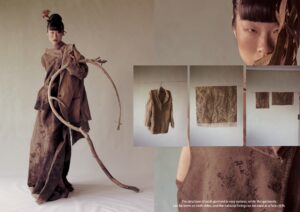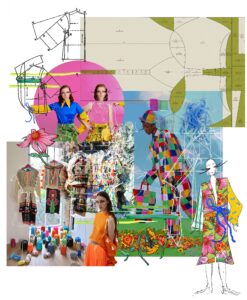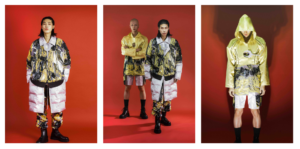Sustainable fashion, also known as eco-fashion, is a growing movement within the fashion industry that emphasizes the importance of environmental and social responsibility throughout the entire fashion supply chain. From sourcing eco-friendly materials to adopting ethical labor practices, sustainable fashion aims to minimize the negative impact of fashion production on the planet and its inhabitants.
In recent years, sustainable designs have gained momentum as consumers become more conscious of their purchasing choices and demand transparency from brands. These designs prioritize environmentally friendly materials, such as organic cotton, recycled polyester, and sustainable alternatives to leather and fur. Innovative techniques like zero-waste pattern cutting, upcycling, and digital printing are also transforming the way fashion is created, making it more sustainable and efficient.

Chinese Garden Journey by Zhuen Cai
We had the privilege of interviewing Hannah Sandler, esteemed winner of the 2023 IDA Sustainable Fashion category, to gain valuable insights into her perspectives on the future of sustainable design and anticipated trends for 2024.

The role of sustainable fashion in today’s world cannot be overstated. It has significantly shaped the fashion industry by challenging traditional practices and inspiring brands to adopt more responsible approaches to design and production. From small independent labels to major fashion houses, many are now incorporating sustainability into their collections and business models, recognizing the importance of exceptional designs that not only look good but also do good for the planet.

reZero by Hannah Sandler
Odelia Wong, 2023 IDA winner in sustainable fashion category states that “In today’s fast-paced world, people lead busy lives and are bombarded with information. However, there is a shift happening in people’s purchasing mindsets and habits, even as most of the brands continue to churn out multiple fashion seasons each year. The fashion industry hasn’t adjusted its buying schedule in decades, but we recognize the need to adapt to the changing landscape.”

Looking ahead to 2024, several trends are expected to dominate the sustainable fashion landscape. Smart designs that integrate technology to enhance sustainability and functionality will continue to gain traction. Creative designs that push the boundaries of traditional fashion norms and celebrate individuality and diversity will also be prominent. Additionally, collaborations between designers, brands, and artisans from around the world will foster innovation and cross-cultural exchange, resulting in truly inspirational designs that resonate with consumers on a global scale.

Speed Cut by Yoon Seo Lee
For designers seeking recognition for their outstanding work in sustainable fashion, prestigious design awards such as the International Design Awards (IDA) offer a platform to showcase their talent and creativity. These awards recognize achievements in design across various categories, including architecture, interior, product, fashion, and graphics. Whether you’re a professional designer or a student, participating in design competitions like IDA can elevate your profile, connect you with industry leaders, and provide valuable exposure for your award-winning designs.

In conclusion, sustainable fashion represents not only a commitment to environmental stewardship but also a celebration of innovation, creativity, and excellence in design. As we strive to build a more sustainable future for the fashion industry, let us continue to support and celebrate the designers and brands that are leading the way towards a more ethical and responsible fashion ecosystem.